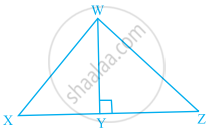Advertisements
Advertisements
Question
Find the values of k if the points A(k + 1, 2k), B(3k, 2k + 3) and C(5k – 1, 5k) are collinear.
Solution
We know that, if three points are collinear, then the area of triangle formed by these points is zero.
Since, the points A(k + 1, 2k), B(3k, 2k + 3) and C(5k – 1, 5k) are collinear.
Then, area of ΔABC = 0
⇒ `1/2[x_1(y_2 - y_3) + x_2(y_3 - y_1) + x_3(y_1 - y_2)]` = 0
Here, x1 = k + 1, x2 = 3k, x3 = 5k – 1 and y1 = 2k1, y2 = 2k + 3, y3 = 5k
⇒ `1/2[(k + 1)(2k + 3 - 5k) + 3k(5k - 2k) + (5k - 1)(2k - (2k + 3))]` = 0
⇒ `1/2[(k + 1)(-3k + 3) + 3k(3k) + (5k - 1)(2k - 2k - 3)]` = 0
⇒ `1/2[-3k^2 + 3k - 3k + 3 + 9k^2 - 15k + 3]` = 0
⇒ `1/2(6k^2 - 15k + 6)` = 0 ...[Multiply by 2]
⇒ 6k2 – 15k + 6 = 0 ...[By factorisation method]
⇒ 2k2 – 5k + 2 = 0 ...[Divide by 3]
⇒ 2k2 – 4k – k + 2 = 0
⇒ 2k(k – 2) – 1(k – 2) = 0
⇒ (k – 2)(2k – 1) = 0
If k – 2 = 0, then k = 2
If 2k – 1 = 0, then k = `1/2`
∴ k = `2, 1/2`
Hence, the required values of k are 2 and `1/2`.
APPEARS IN
RELATED QUESTIONS
Find the values of k so that the area of the triangle with vertices (1, -1), (-4, 2k) and (-k, -5) is 24 sq. units.
Show that the following sets of points are collinear.
(2, 5), (4, 6) and (8, 8)
Four points A (6, 3), B (−3, 5), C(4, −2) and D (x, 3x) are given in such a way that `(ΔDBG) /(ΔABG)=1/2,` find x
Find the area of ΔABC whose vertices are:
A(-5,7) , B (-4,-5) and C (4,5)
Find the area of ΔABC whose vertices are:
A(10,-6) , B (2,5) and C(-1,-3)
Prove that the points A (a,0), B( 0,b) and C (1,1) are collinear, if `( 1/a+1/b) =1`.
Let `Delta = abs (("x", "y", "z"),("x"^2, "y"^2, "z"^2),("x"^3, "y"^3, "z"^3)),` then the value of `Delta` is ____________.
Find the area of the triangle whose vertices are (–8, 4), (–6, 6) and (–3, 9).
Find the cost of laying grass in a triangular field of sides 50 m, 65 m and 65 m at the rate of Rs 7 per m2.
Ratio of the area of ∆WXY to the area of ∆WZY is 3:4 in the given figure. If the area of ∆WXZ is 56 cm2 and WY = 8 cm, find the lengths of XY and YZ.

